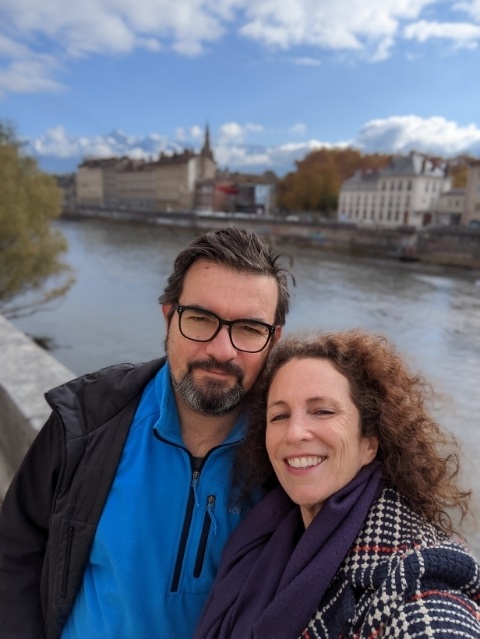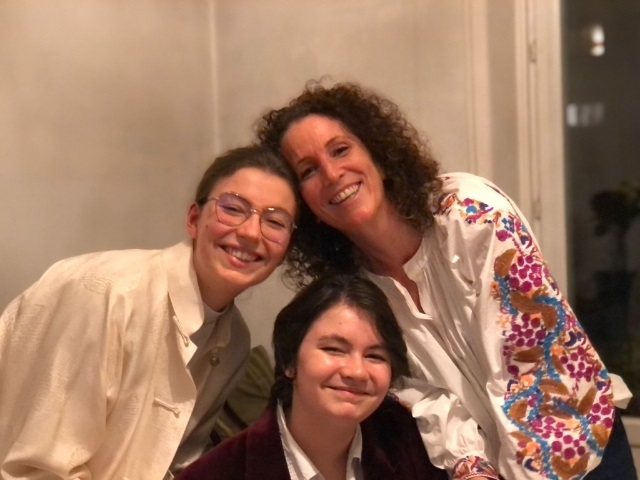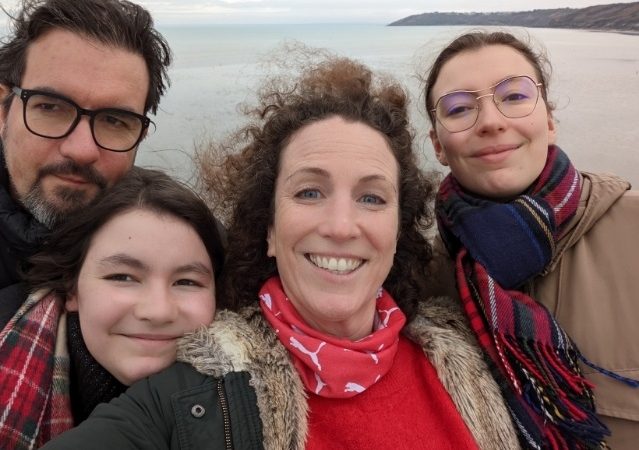Alumni Story – Reia Anquet (Farrall) (1992)
Posted on July 14, 2022
We were delighted to catch up with Reia Anquet (Farrall) recently whilst she was visiting from France. Reia kindly shared a bit about her life in France and insights into her journey since leaving Friends’.
***
What happened when you left School, what path did you take to get where you are now?
Three events have changed my life, and all have to do with The Friends’ School.
- Coming to Friends’ School as a grade ten student
As you can imagine, there is a bit of a myth in my family surrounding The Friends’ School. Growing up in Geelong, I came to Hobart during the school holidays to spend time with my grandparents Marjorie and Bill Oats. We would hear stories of how they became Quakers, how they met, what they did when they were at Friends’, and many stories about teaching and inspiring life stories of students and faculty. Mum would also tell me stories of when she had been a student at Friends’.
When mum and dad told me they would like to apply for the co-principalship of Friends’ I was more than OK. I was so very excited to ‘finally’ be part of the Friends’ world! I even ended up having the same bedroom as mum at Pendle Hill.
- Going to France as a grade eleven student
When I arrived at Friends’ School, it was not as I had imagined. I had thought it would be easy to fit in, that the schoolwork would be stress-free. Neither of these things was true. Amid all that teenage angst and moving to Hobart, I asked my parents if I could go on exchange. They said yes, so I went to France for a year as a 15-year-old. I was then able to experience how difficult life can sometimes be when you’re in a new place, and you can’t speak the language. I learnt very quickly how important it is to communicate with others and how important it is that you ask questions and find out things about other people. How to not take yourself too seriously.
After a year in France, coming back to Friends School, you could not keep me quiet. I joined as many sports teams as possible and coached a netball team and a rowing crew. I loved matric. I also studied a bit harder and enjoyed the fact that I could take Music, Geology, and Religious Studies, among the other more ‘standard’ subjects. My daughters don’t have those opportunities to play sports or music or study ‘special’ subjects in the French school system as we did at Friends’. We are fortunate to have had the education and all the possibilities that Friends’ gives us. Also, the emphasis that every person is remarkable, that it is not just academic excellence that is important, but also the social and emotional educational environment that is essential for helping people reach their full potential. Being at Friends’ enables everyone to be themselves and be proud of who they are, but also to realise that you might have to learn something – this is what the Friends’ education did for me.
- Going to teach at Tokyo Friends’ School
I had just finished my BA (Hons) in Environmental Policy at UTAS and thought I would like to teach, but I was unsure. I had the chance to go and teach at our sister school in Tokyo for a couple of years. Wow, what an opportunity! I just loved it. The high school programme I was teaching was innovative, and we did a lot of plays and different activities that ensured that students were physically active while also learning a language. At the same time, I was studying for my Grad. Dip. Ed., and in my courses, I was asked to think about teachers that had changed how I perceive life and inspired me to teach in specific ways. All my teachers at Friends’ had influenced me, and I tried to adopt those teaching methods and pedagogical tools that motivated and supported me as a Friends’ School student. I teach now at university, but these thoughts still permeate how I act in a classroom and construct my curriculum outside class.
Friends’ School is not only present in me as a teacher but also as a social and feeling being. Being at Friends’ with all those wonderful people gave me the confidence to approach any situation and life in general. Incidentally, I met my husband Nicolas in Tokyo, which changed my life a bit.

Where are you now? What are you doing professionally?
I live in Grenoble, France – in the middle of the French Alps – with Switzerland and Italy about a 2-hour drive away, which sounds dreamy, except that it costs so much to drive there that we never do. We also don’t have a car! I live there with my French husband Nicolas (we were married in a Quaker ceremony in Hobart in 2000) and with my youngest daughter Eléonore – 16, and our cat Romeo. Our eldest daughter – Eloise – is in her first year studying Asian Studies and Economics at ANU.

I am a lecturer in English at the Political Science Institute of Grenoble and finishing my Ph.D. thesis on The Environmental Estate of Australia’s First Nations and Policy Change. I lecture on Australian National Identity and History, Public Policy, Environmental Policy, and Indigenous Peoples’ Rights.
Do you have a fond memory of your time at Friends?
I have many good memories at Friends’, involving fellow students and teachers. There are so many memories that I can’t list them all. When I return to Hobart, I first catch up with friends and my Friends’ teachers after seeing mum and dad. I miss Wendy Chapman dreadfully, who I would manage to see once a year as she would come to France as much as she could.
Did you have any mentors at Friends or people elsewhere who deeply influenced who you are, what you believe in and what you are committed to in life and work?
I can’t thank the teachers that I had at Friends’ enough. In my daily practices as a teacher, I often think of something that you did, a way that inspired me to learn, or how to be a thinking and considerate person – and I will try to use this in the classroom. I try to think about that way of being – letting your life speak – and do just that.
Many of the Quaker philosophies in life – simplicity; there is that of God in everyone; reach into yourself to find that stillness, that quiet; – echo throughout my life. And they help me in those difficult times. Being comfortable in silence helps you in many ways.
Two aspects of how I live my life make things difficult for me, and I do not know whether it was from my being at Friends’ School or my family or just who I am – Reia – that has made me like that. The first one is that I believe or did believe that everyone functions with the community’s best interests at heart and not for their own purposes. It was quite a shock to learn that sometimes people act in their own interest and manipulate others to achieve this!
The second thing is the need I have to push myself constantly. Rather than running a marathon – I’ll sign up for the 100km race. Rather than being satisfied with finding a casual teaching job in France, I’ll study and work simultaneously to pass the highly competitive exam to become an English teacher there. When I finally became a university lecturer, I also have to do a Ph.D. in Environmental Policy to have better analytical skills to be an accomplished university lecturer.
I’ve been studying part-time, being a mum, and teaching full-time for almost 20 years now. It might be time to take on those French attitudes about work and holidays. The belief that holidays are all important and work should play second fiddle to everything else in your life. I need someone to tell me what Babe the pig is told, “That’ll do [Reia], that’ll do.”
Do you have any advice for our current students or your younger self?
Get out of your comfort zone. Learn a language or two or three. Don’t worry about what other people think of you. Be that sunshine in someone’s day. And if you can’t be that sunshine in someone else’s day, be it for yourself!
